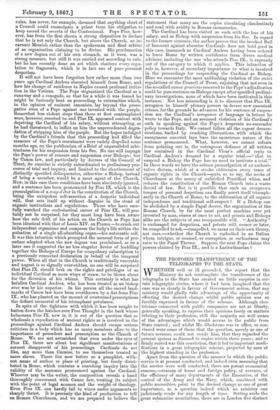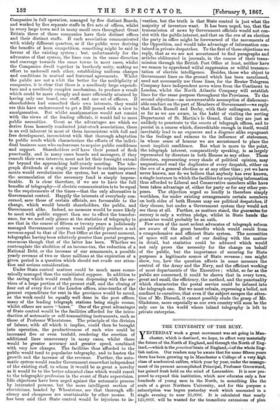THE PROPOSED TRANSFERENCE OF THE TELEGRAPHS TO THE STATE.
WHETHER well or ill grounded, the report that the Ministry do not contemplate the transference of the telegraphs to the State has created no little surprise in cer- tain telegraphic circles, where it had been imagined that the case was so clearly in favour of Government action, that any ministry would gladly take advantage of the opportunity of effecting the desired change whilst public opinion was so forcibly expressed in favour of the scheme. Although elec- tricians connected with public companies are not at liberty, generally speaking, to express their opinions freely on matters relating to their profession, still the majority are well aware of the advantages which would accrue to the public from State control ; and whilst Mr. Gladstone was in office, so con- vinced were some of them that the question, merely as one of future revenue, could not evade him, that they regarded the present system as doomed to expire within three years ; and so firmly rooted was this conviction, that it led to important modi- fications in a great telegraphic scheme, projected by men of the highest standing in the profession. Apart from the question of the manner in which the public service is at present conducted, and indeed even assuming that the service were well conducted, there are potent economical reasons,—reasons of home and foreign policy, of revenue, of the efficiency of many departments of the Executive, of the control of the Army and the Navy, which, combined with public necessities, point to the desired change as one of great importance, as a question indeed which no ministry can judiciously evade for any length of time. Setting aside the great submarine associations, there are in London five distinct Companies in full operation, managed by five distinct Boards, and worked by five separate staffs in five sets of offices, whilst in every large town and in many small ones throughout Great Britain three of those companies have their distinct offices and their distinct staffs. If each association communicated with widely different quarters, or if the public were deriving the benefits of keen competition, something might be said in favour of the existing system ; but, unfortunately for the
advocates of that system, the lines run in the same direction and converge towards the same towns in most cases, whilst the Companies dwell together in brotherly unity, making no effort to undersell each other, establishing uniform charges and conditions in mutual and fraternal agreements. Whilst the public are not a whit the better for the multiplicity of companies, it is clear that there is a needlessly large expendi- ture and a needlessly complex mechanism, to produce a result which could be more cheaply and more efficiently attained by having only one board, one staff, and one set of officers. If shareholders had consulted their own interests, they would ere this have endeavoured to get a Bill passed with a view to amalgamation. But whilst amalgamation would not consist with the views of the leading officials, it would fail to meet public necessities. Great as the advantages are which we derive from honestly conducted joint-stock associations, there is an evil inherent in most of them inconsistent with full and free development, inconsistent with that thorough adaptation to public needs which characterizes the efforts of the indivi- dual business man who endeavours to acquire public confidence and support. Shareholders will have their pound of flesh punctually, and in many cases boards and managers, if they consult their own interests, must not let their foresight extend far beyond the approaching half-yearly meeting. The tele- graph dividends of a single year devoted to certain improve- ments would revolutionize the system, but as matters stand the accumulation of the necessary fund is simply imprac- ticable. It is clear therefore, if we are to have the full benefits of telegraphy—if electric communication is to be equal to the requirements of the times—that the only alternative is Government control. Happily the interests of everybody con- cerned, save those of certain officials, are favourable to the change, which would benefit shareholders, the public, and Government alike. Indeed, no measure would be more likely to meet with public support than one to effect the transfer- ence, for we need only glance at the statistics of telegraphy to see that in the course of fifteen or twenty years a judiciously managed Government system would probably produce a net revenue equal to that of the Post Office at the present moment, telegraphic having been relatively greater than postal progress, enormous though that of the latter has been. Whether we contemplate the abolition of an income-tax, the reduction of a National Debt, or the increase of our armaments, a possible yearly revenue of two or three millions at the expiration of a given period is a question which should not evade our atten- tion and serious consideration.
Under State control matters could be much more econo- mically managed than the uninitiated suppose. In addition to the saving which would result from dispensing with the ser- vices of a large portion of the present staff, and the closing of four out of every five of the London offices, nine-tenths of the present expenditure for rent in the provinces would be saved, as the work could be equally well done in the post offices, many of the leading telegraph stations being single rooms, whilst others are mere "boxes." One of the great advantages of State control would be the facilities afforded for the intro- duction of automatic or self-transmitting instruments, such as those of Professor Wheatstone. The principle of the division of labour, with all which it implies, could then be brought into operation, the productiveness of each wire could be increased five or even tenfold, rendering the erection of additional lines unnecessary in many cases, whilst there would be greater accuracy and greater speed, combined with very low charges. The facilities thus afforded to the public would tend to popularize telegraphy, and to hasten the growth and the increase of the revenue. Further, the auto- matic system would render Government somewhat independent of the existing staff, to whom it --would be as great a novelty as it would be to the better educated class which would resort to the telegraphic profession in the event of State supervision. Idle objections have been urged against the automatic process by interested persons, but the more intelligent section of electricians, headed by Wheatstone, see that thorough effi- ciency and cheapness are unattainable by other means. It has been said that State control would be injurious to in- vention, but the truth is that State control is just what the majority of inventors want. It has been urged, too, that the transmission of news by Government officials would not con- sist with the public interest, and that on the eve of an election the party in office might be forewarned of the movements of the Opposition, and would take advantage of information con- tained in private despatches. To the first of these objections we reply, that as we are not accustomed to find paragraphs and articles obliterated in journals, in the course of their trans- mission through the British Post Office at least, neither have we reason to apprehend wilful suppression or wilful transmu- tation of electric intelligence. Besides, those who object to Government lines on the ground which has been mentioned, need not necessarily use those lines, for the Renter Telegram Company have independent news wires from the Continent to London, whilst the North Atlantic Company will establish lines for the same purpose throughout the Provinces. To the second objection—an unwarrantable assumption of dishonour- able conduct on the part of Members of Government—we reply that Earls Russell and Derby, with their colleagues, are not, so far as we are aware, in the habit of visiting the sorting Department of St. Martin's le Grand, that they are just as unlikely to penetrate to the sancta of telegraph offices, and to persist in a course which, discreditable enough in itself, would inevitably lead to an exposure and a disgrace alike repugnant to the feelings and ruinous to the influence of statesmen, in whose sense of honour we are accustomed to place the most implicit confidence. But what is more to the point, the telegraph interest, comparatively speaking, is as largely represented by directors in both Houses as any other. Those directors, representing every shade of political opinion, may unquestioned read the duplicates of every despatch, either on the eve of a general election or at any other time ; yet we have never known, nor do we believe that anybody has ever known, a single instance in which the facilities for acquiring information thus afforded to Liberal and Conservative members alike have been taken advantage of, either for party or for any other pur- poses. The objection urged so loudly is therefore simply worthless, for under existing arrangements certain members on both sides of both Houses may see political despatches, if they choose, but under a Government system they would not see them at all. Further, as matters stand, the guarantee for secrecy is only a written pledge, whilst in State hands the guarantee would probably be an oath.
Few even of the most ardent advocates of telegraph reform are aware of the great benefits which would result from a comprehensive and efficient State system. The necessities of space will not admit of our dealing with the matter in detail, but statistics could be adduced which would not only prove the necessity for the change on behalf of the public, but the importance of securing for State purposes a legitimate source of State revenue ; one might show, too, how the question affects in some measure the control of the Army and the Navy, and the efficient working of most departments of the Executive ; whilst, so far as the public are concerned, it could be shown that in every town, great and small, the efficiency, the method, and the punctuality which characterize the postal service could be infused into the telegraph one. But we must refrain, expressing a belief, not confined to ourselves, that even if the subject escapes the atten- tion of Mr. Disraeli, it cannot possibly elude the grasp of Mr. Gladstone, more especially as our own country will soon be the only one in the world where inland telegraphy is left to private enterprise.































 Previous page
Previous page